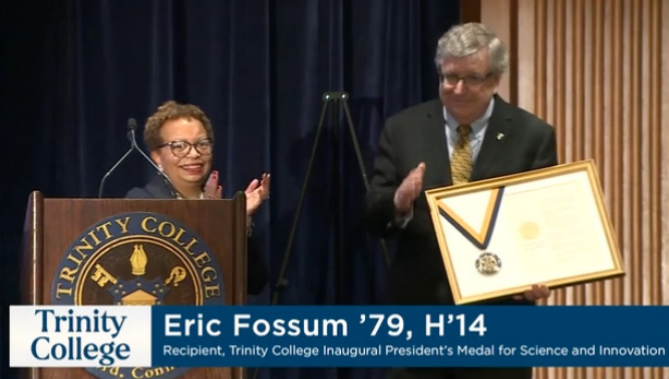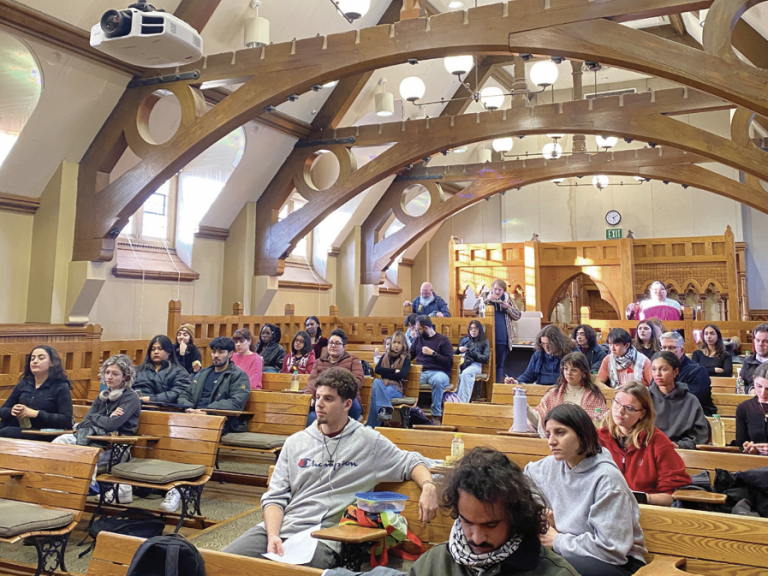Rajsi Rana ’26
News Editor
Trinity College recently held its spring semester celebration of its Bicentennial year, marking 200 years of existence, with a theme of Reflection and Action. Throughout the day on Feb. 28, several events were held ranging from several academic subjects from Theatre and Dance to Public Policy and Law. Several STEM events were held, from panels with speakers comprised of faculty and students, to a President’s Medal awarded to an alumnus, Eric Fossum ’79 H ’14.
The STEM events held included a Women Junior Faculty panel, a Women in STEM Student Research Panel and a Presentation of the President’s Medal for Science and Innovation and Presidential Distinguished Lecture. Particularly, each of these events focused on the perspective of STEM in a liberal arts setting like Trinity.
The day of STEM events kicked off with a Women Junior Faculty Panel titled “Breaking New Ground: Challenges and Opportunities for Women Junior Faculty in STEM.” Panelists included Assistant Professor of Chemistry Lindsey Hanson, Assistant Professor of Mathematics Kirsti Kuenzel, Assistant Professor of Mathematics Lina Ma, Assistant Professor of Biology Nikisha Patel, Assistant Professor of Physics Kelly Patton and Assistant Professor of Neuroscience Sally Seraphin, with Amber Pitt as the moderator. These panelists were representative of several different STEM departments at Trinity and discussed their journeys into STEM careers, the hardships experienced as women in STEM and their perspectives on STEM at a liberal arts institution.
The panel began with each panelist answering the question, “Who or what inspired you to get into your fields?” Hanson answered by saying, “In high school, I loved science. When I took chemistry in high school, my teacher was like, ‘you’re going to major in chemistry!’ The next time I took chemistry, the teacher said, ‘are you sure you want to stay in this chemistry class? You might not be able to keep up with the boys.’ I was like, ‘yes I can, watch me!’” The other panelists’ interest in their STEM fields came from inspiration from their family, mentors and other life experiences. Many of them had a love for science since childhood in common.
The moderator led the group into a more serious discussion by asking, “What challenges have you faced and do you have any suggestions on how Trinity College as an institution can help better support you and your students?” The panelists discussed some of the limitations they face with their research projects at a smaller, non-research institution. Patton said, “Recently I had eight to 10 students ask me if I was doing research this summer…I don’t have eight to 10 projects! I want to say yes but I can’t say yes to all of them.”
In regards to being STEM faculty at a liberal arts institution, the panelists discussed the joy they feel when they can mentor students who are excited about research.
The next event was a Women in STEM: Student Research Panel. This panel featured Alexandra Barbosa Gonzalez ’24, Maddy Boehm ’26, Eleanor Burke ’26, Shirin Dadina ’24, Denisse Olmedo ’24, Sharon Sango ’25 and Ginger Watzinger ’25, with Lori Watson as the moderator. The students are majoring in varied STEM fields.
These student researchers discussed their interests in STEM, their research work and how they got their foundations. Several of them credited their research foundations to the Interdisciplinary Science Program (ISP) at Trinity. “I was able to explore the different research opportunities at Trinity early on,” said Burke.
When discussing the research projects they work on at Trinity, Watzinger said, “I love the feeling when I finally understand something, after working at it for some time, when everything just clicks.” Several of the panelists elaborated on that feeling, describing their own experiences of working on their research projects for a long time, until it finally made sense, or they could get used to completing their tasks efficiently.
Several times during the panel, the topic of impostor syndrome came up. Panelists touched on their experiences as women in the STEM field, and how they feel compared to their male counterparts. They concluded the panel by discussing the positive impact their research mentors have had on them, in terms of their confidence in research and STEM courses.
Finally, the Presentation of the President’s Medal for Science and Innovation and Presidential Distinguished Lecture arrived, with the lecture titled “Educating The Next Generation of STEM Leaders Through Liberal Arts: How Innovative and Inclusive Thinkers Will Help Us Solve Future Issues.”
At this event, President Joanne Berger-Sweeney gave a quick introduction to Fossum, a Trinity College alumnus and inaugural medal winner. “Trinity College is committed to the study of the STEM fields. As a scientist myself, I know how integral the scientific evidence-based thinking about the natural world is to a broad interdisciplinary liberal arts education.”
After Fossum was awarded the medal, Freeman A. Hrabowski III came up to speak. Fossum invented the camera-on-a-chip technology that is used in smartphone cameras and other applications. On this invention, Hrabowski said, “Some of the greatest achievements people never think about, whether it is looking at a camera, or the heat in this room. Similarly, as we think about the humanities, the social sciences, the arts and the ethics of what we do. As I talk and you look at young people protesting issues involving life itself, we must remember to seek [the] truth.”
At this event, a silent protest of students for justice in Palestine occurred. Hrabowski discussed his own experiences with activism and the importance of student voices.
All of these events highlighted the unique experience of being involved as a student, alumni or faculty in a STEM department at a liberal arts institution and the journeys they all took to get there.





+ There are no comments
Add yours